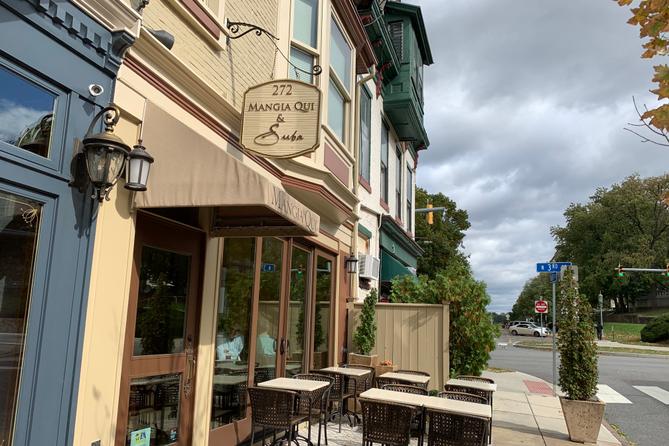In the state Senate, Shelly Brown is a top administrator, earning $162,000 a year to make sure employees get their parking and paychecks and avoid personnel problems.
Come lunch time, however, she seemingly dons another hat: political operative for her boss, Senate leader Joe Scarnati.
Brown is one of two taxpayer-funded staffers under Scarnati who have access to a credit card issued by the top Republican’s political operation, even though neither of them has an official role with the campaign.
Under Pennsylvania election law, campaign accounts must be used for “influencing the outcome of an election.” But what qualifies is largely open to interpretation, and the Department of State, which oversees campaigns, has almost no enforcement power.
» READ MORE: Lavish dinners, sports tickets, and nearly $3.5 million other expenses by Pa. lawmakers you’ve never seen
What’s more, Pennsylvania has one of the country’s weakest campaign laws, with no explicit ban on using campaign coffers for personal benefit.
Since late 2015, Brown has charged at least $68,875 to the card for food and drinks, including dozens of lunches and dinners at restaurants, bars and other establishments around the state, according to records of receipts and credit card statements obtained by the Caucus and Spotlight PA.
In the records, the expenses were sometimes described as “staff lunches” or gatherings with other legislative employees. Other times, the expenses were listed as catering for unspecified events, or had no explanation. None of the receipts was itemized.
Brown declined a request for an interview, but said in response to emailed questions that she does not use the card to campaign for Scarnati. Instead, she said, she is authorized to use it for spreading political goodwill, including buying colleagues a meal.
“The election prospects of a senator often depend upon the senator’s success as a legislator, which is in part a function of the effective work of the senator’s staff,” she wrote.
Barry Kauffman, who led Common Cause Pennsylvania for decades before retiring in 2016, said the political goodwill argument “generally doesn’t cut the mustard.”
“If it’s just having drinks and dinners with friends, maybe that should come out of your own wallet,” said Kauffman, who lobbied lawmakers for years to toughen campaign finance laws, including asking candidates to be more specific when disclosing expenses.
Brown’s purchases were uncovered as part of a year-long investigation by the Caucus and Spotlight PA into how many of the state’s most powerful lawmakers obscure the details of their campaign expenses in public disclosure forms.
As part of the investigation, the news organizations requested statements and receipts from Scarnati’s campaign and those of other top lawmakers from 2016 through 2018. In some cases, the expenditures were publicly listed with broad descriptions such as “credit card,” “meals,” or “campaign expenses,” and a total amount, with no other details.
» DONATE NOW and support future investigations by Spotlight PA that hold the powerful in Pennsylvania to account. Become a Founding Donor and support our investigative journalists.
In the case of Brown, public disclosure forms do not detail her expenses or make it known that she’s the one spending the money.
For instance, voters would never know that on Jan. 22, 2016, she swiped her card at 1:07 p.m. at Mangia Qui, a restaurant across from the Capitol, picking up the $426 tab, records show. At 4:18 p.m., she charged an additional $144 at the Firehouse, a restaurant a few blocks away that has since closed. About an hour later, she again used the card to pay a $34 bar bill.
Another staff luncheon, on April 14, 2016, began at Lancaster Brewing Co., where Brown paid $313 at 2:26 p.m., and later migrated to Arooga’s, a sports bar a block from the Capitol in downtown Harrisburg, where she spent $49 just after 4 p.m. The guests at the lunch were not specified in receipts provided by the campaign.
And in November of that year, Brown dropped $854 dining at restaurants around Harrisburg, including one outing described as an “Escape Room lunch” for her and senior staff at a restaurant along the main drag in Hershey. Those expenses came in the days after the hotly-contested presidential election.
Scarnati’s campaign was the only one among the dozens of campaigns contacted as part of the investigation that had issued campaign credit cards to government staffers.
Lawrence Tabas, a lawyer for the campaign, said in a written response that some of Scarnati’s taxpayer-funded staff help with campaign activities. When they do, he said, it’s strictly on a volunteer basis and on their own, personal time.
Tabas also said Scarnati’s campaign “pays for any reasonable expense that has multiple purposes, which include the purpose to influence the outcome of an election.”
“The matters discussed at these lunches cover a wide variety of topics, including political and election matters,” he said of Brown’s outings.
» READ MORE: Hours after investigation reveals millions in hidden campaign spending, Pa. lawmakers push for less oversight
State workers are not prohibited from campaigning, but they must do so on their own time. That rule was at the center of a scandal a decade ago nicknamed “Bonusgate,” in which taxpayer-funded legislative employees who worked on campaigns were given generous bonuses, also paid for by taxpayers.
The scandal spawned a series of high-profile prosecutions that ended with a half-dozen lawmakers in prison, including two former House speakers.
Though it did not move the legislature to enact sweeping reforms, the scandals did heighten awareness of the perils of mixing governing and campaigning. Kauffman said keeping government and campaign staffs distinctly separate is a good idea.
“I think the public should have some assurance that regardless of politics, public officials — including their employees — will always be making decisions on behalf of taxpayers and voters,” he said.

